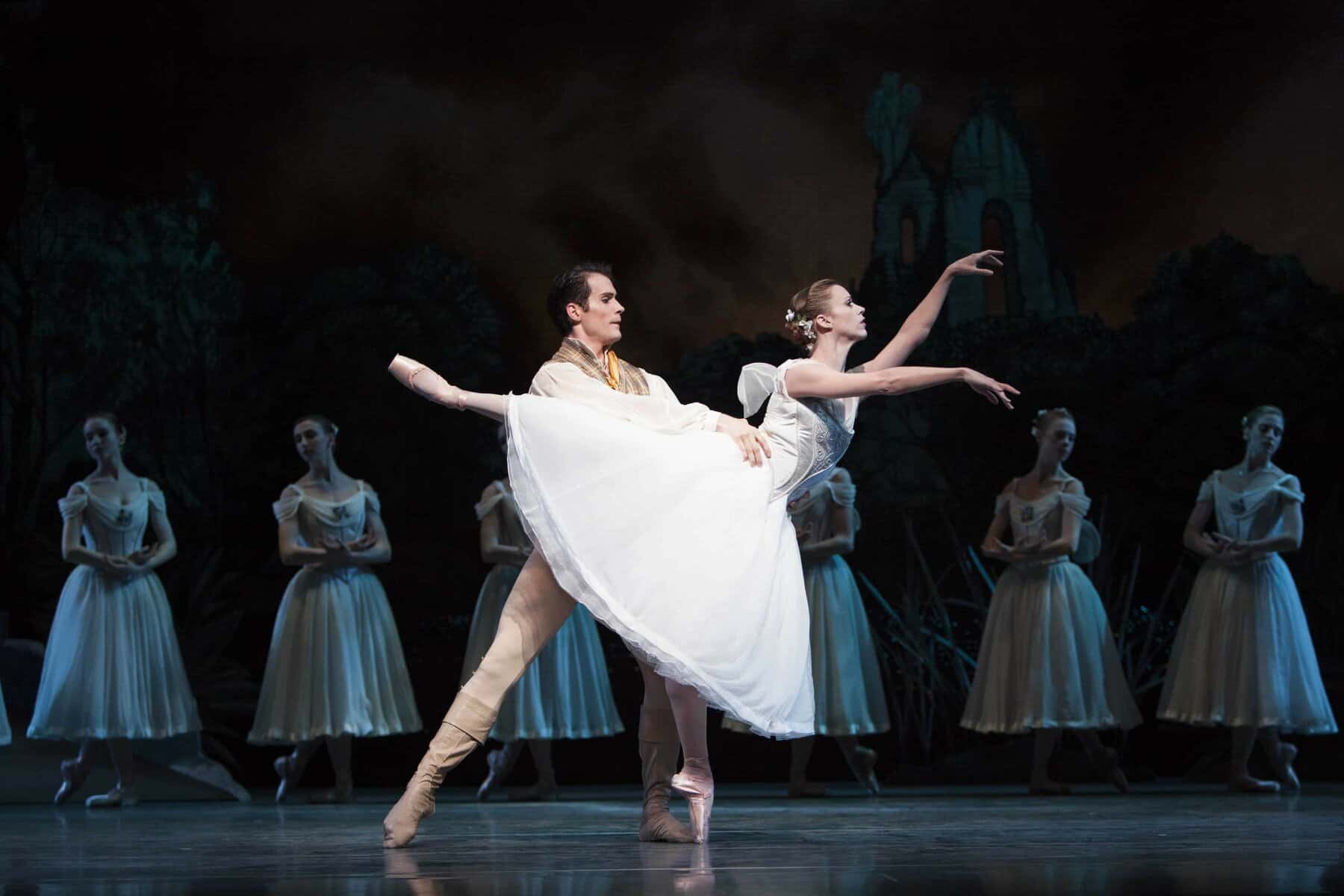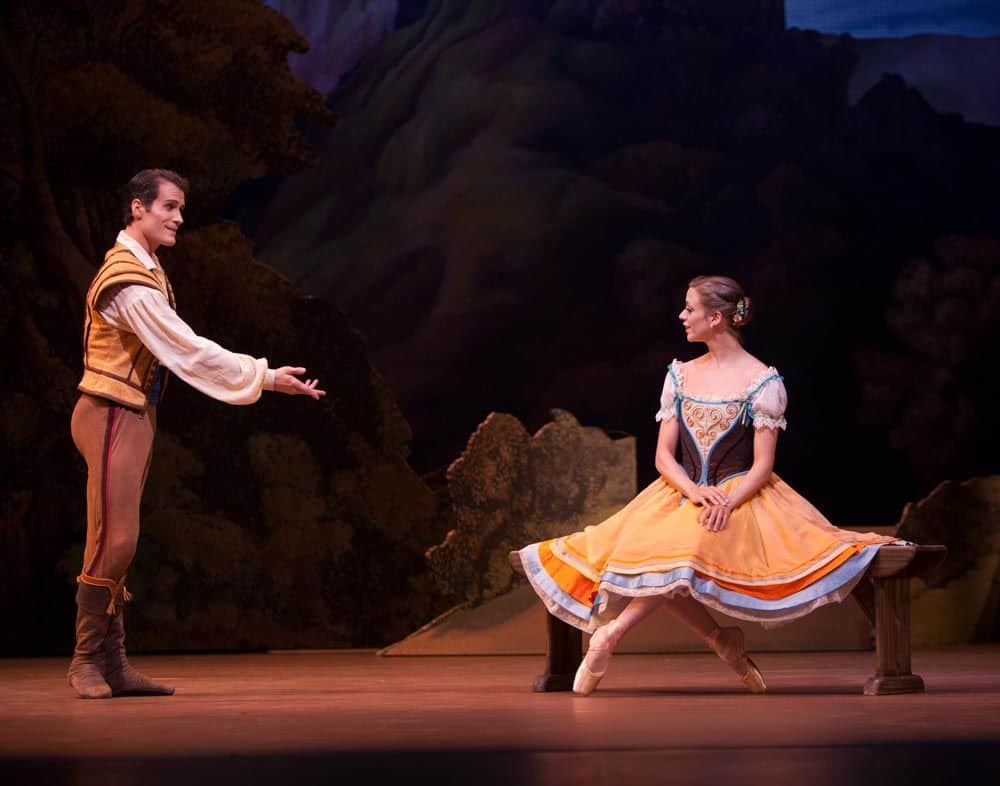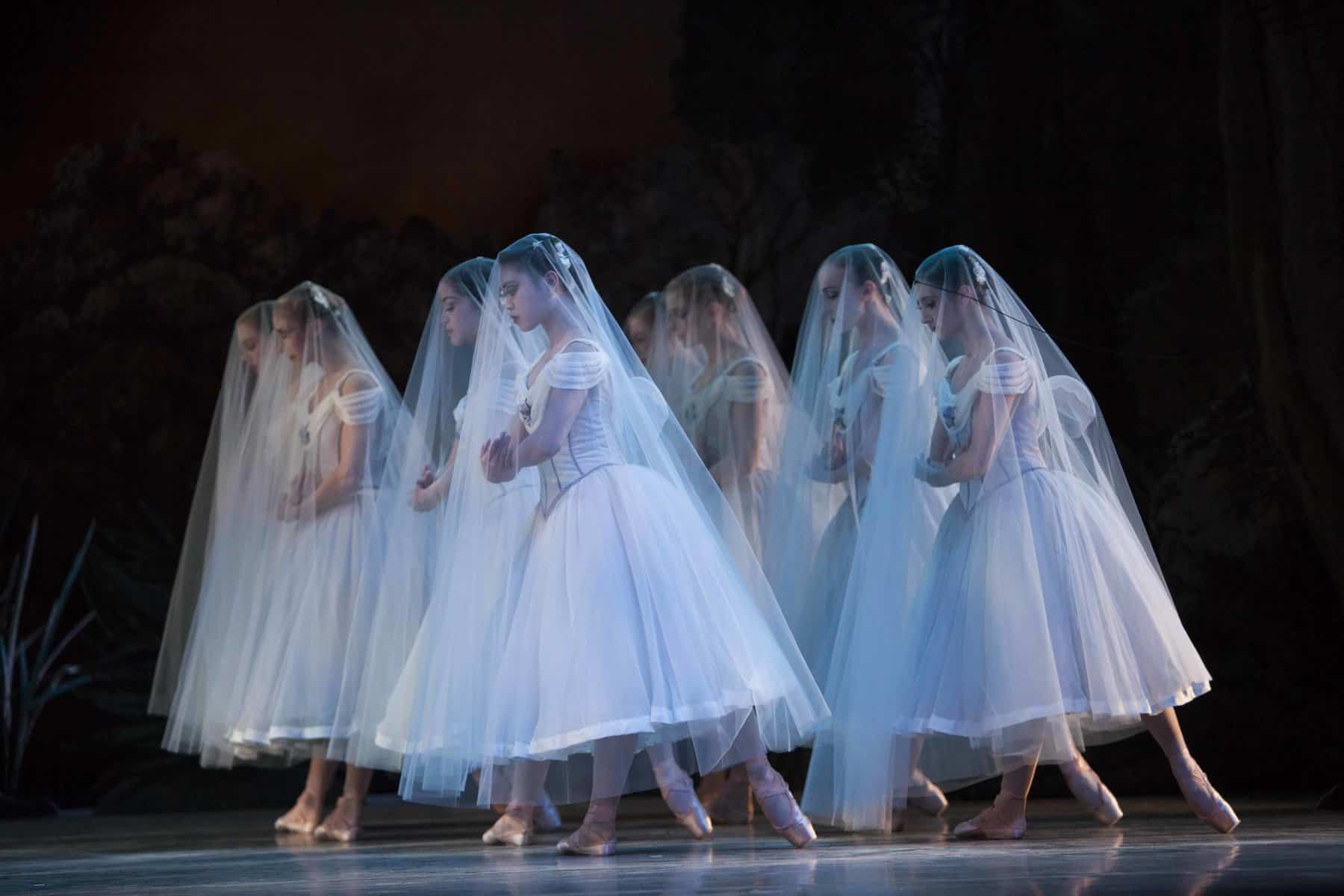The Story of Giselle

Lesley Rausch and former dancer Seth Orza © Angela Sterling
Act I
As the curtain rises on a picturesque scene in a small German village, vine gatherers depart for the harvest. Hilarion the gamekeeper arrives, hoping to see the lovely Giselle. He hides when his rival Albert-really a Duke disguised as a peasant named Lays-emerges from his cottage, with his squire Wilfride. Wilfride begs Albert not to pursue Giselle, but he ignores this advice and sends Wilfride away. Albert knocks on Giselle’s door; she comes out of her cottage and the two of them delightedly talk and dance together. As they embrace, Hilarion, unable to restrain himself any longer, runs up to Giselle and reproaches her conduct. Giselle reacts disdainfully, and Albert warns him to cease his amorous pursuit of Giselle. Angrily, Hilarion departs.
A troupe of young vine gatherers comes to fetch Giselle, for duty calls-the grapes must be harvested. Giselle, passionately fond of dancing and diversion, talks them into postponing work and dancing instead. Everyone joins together in a merry German waltz. The carefree scene is interrupted by Giselle’s mother Berthe, who comes out of their cottage to scold her daughter: “You are always dancing instead of working!” “What’s more,” Berthe says, “your health is fragile, and if you dance too much, you could die.” As Giselle’s friends gather around, Berthe tells the frightening tale of the Wilis-ghosts of dead brides-to-be who never reached their wedding day-who rise from their graves at night to kill any men who happen by. The crowd is terrified by this story; Giselle alone is unfazed and laughs it off. The fanfares of the hunt are heard in the distance. Albert is worried by this sound, and he quickly hurries the peasant girls away and departs the scene himself. Hilarion, now alone, furtively gains entry to Albert’s cottage in an attempt to find out his rival’s true identity. Soon the noble hunting party, including the magnificently dressed Prince and his daughter Bathilde, arrive in the village, hoping to find a favorable spot for repose and refreshments during the heat of the day. Berthe and Giselle happily oblige. Bathilde finds Giselle charming and engages her in conversation, asking about her work and her pastimes, and asking if she has a sweetheart.
The Prince sends his retinue back to the hunt, informing them that he will summon them with his horn later. After all is quiet, Hilarion emerges from his rival’s cottage holding a nobleman’s sword: he has figured out that his rival is a great lord; a seducer in disguise! He hides the sword, waiting for the right moment to expose the truth about Albert.
Now it is time for the harvest festival. A wagon decorated with flowers comes into view and little Bacchus is carried triumphantly astride a cask in keeping with an old country tradition. Giselle dances with Albert, surrounded by the entire village. The happy scene ends with a kiss that Albert bestows on Giselle.
At this sight, the fury of the jealous Hilarion knows no bounds. He throws himself into the middle of the crowd and declares Albert to be a nobleman in disguise. Giselle responds with disbelief. But Hilarion produces Albert’s sword for all to see. He then seizes the horn and blows it forcefully, summoning the entire hunting party, which comes rushing in. The nobles recognize Duke Albert and overwhelm him with salutations and deference.
Giselle can no longer doubt Albert’s deception. She is devastated, and goes mad. She recalls her happy times with Albert, seizes his sword, and nearly kills herself before he grabs it away. Life seems to abandon her; her mother takes her in her arms, and moments later, Giselle dies. Albert tries to revive her, but sees that her heart has ceased to beat. He is consumed with despair as the peasants and noblemen gather sorrowfully around Giselle’s lifeless body.

Lesley Rausch and former dancer Seth Orza © Angela Sterling
Act II
The curtain opens in a dark and gloomy forest on the banks of a pond. Giselle’s tombstone can be seen at the left; the bluish gleam of the moon gives a cold and misty appearance to the scene. Several gamekeepers arrive, hoping to set up an observation post, but Hilarion warns them away: this is the place where the Wilis gather at night, attacking any men who stray into their territory, drowning them or forcing them to dance themselves to their death. Distant chimes strike midnight-the hour when the Wilis appear-and the men flee in terror as will-o’-the-wisps flash threateningly around them.
Myrtha, the queen of the Wilis, arrives on the scene, mysteriously radiant and piercing the shadows of the night. She summons the other Wilis to join her in a fantastic ball. The Wilis, including Moyna and Zulme, present themselves to their sovereign, and soon all of the Wilis are waltzing with abandon, gratifying their love for dancing which they were unable to fulfill in life. Before long, at a sign from the queen, the dance comes to an end, and Myrtha announces the arrival of a new Wili.
Giselle appears, rising from her grave, wrapped in a shroud. When Myrtha touches her with her rosemary branch, the shroud falls off and Giselle is transformed into a Wili. She dances with fervor until a sound is heard in the distance. The Wilis disperse and hide themselves.
Some youths are returning from a festival in a neighboring village. The Wilis seek to detain them and try to force them to dance. However, an old man throws himself in their midst and warns them of the danger; they barely escape, with the Wilis in hot pursuit.
The grief-stricken Albert appears with his faithful squire, Wilfride. Though Wilfride begs Albert not to linger near the fatal tomb, Albert sends him away. Soon thereafter, Albert, in his state of sorrow, believes he sees the ghost of Giselle. He tries to embrace her, but he cannot. She looks at him lovingly and throws him some roses. Giselle disappears back into her tomb. Albert is about to depart the scene when he sees Hilarion.
Hiding behind a tree, Albert watches as the poor hapless gamekeeper, frightened nearly to death and begging for pity from the Wilis, is forced to dance himself to exhaustion. The cruel Wilis throw him into the pond and then begin dancing amongst themselves.
Then, to Albert’s horror, Myrtha spots him in his hiding place: a fresh victim! Desperately, he tries to escape, for he knows what cruel fate awaits him. But Giselle re-appears miraculously, takes him by the hand, and leads him to her tombstone, a marble cross, which holds a power even stronger than that of the Wilis. Just as Myrtha is about to touch him with her scepter, it breaks in her hands. Myrtha is furious at her loss of power.
As a last resort, and seeking revenge on the Wili who robbed her of her prey, Myrtha extends her hand toward Giselle and casts a spell on her. Giselle begins a slow, graceful dance, as though transported by an involuntary delirium. Albert is unable to resist the Wili Giselle and he leaves the cross-the only thing that could protect him-and begins dancing ardently with her. Giselle has no choice but to keep dancing, for she is under Myrtha’s spell. Albert becomes exhausted.
Just as it seems Albert will dance himself to death, the first rays of the sun appear. It is morning! The chimes strike four. Albert’s life is saved. Because the Wilis lose their power in daylight, they must withdraw. Giselle, too, must return to her grave. Albert kneels by her and gives her a kiss, as if to restore her to life, but Giselle seems to say that she must obey her fate and leave him forever. Suddenly, loud fanfares are heard; Wilfride, the faithful squire, arrives on the scene with the Prince and Bathilde, whose efforts, he hopes, will be more effective than his own in persuading Albert to leave this place of sadness. Giselle points Albert toward Bathilde, as if to tell him it is her last wish that he marry the young noblewoman. Albert is heartbroken, but the Wili’s command to him seems sacred. With sorrow, Albert gathers up the flowers on her grave and lovingly presses them to his lips and to his heart. As he falls into the arms of those who surround him, he reaches out his hand to Bathilde.

PNB Company dancers © Angela Sterling
